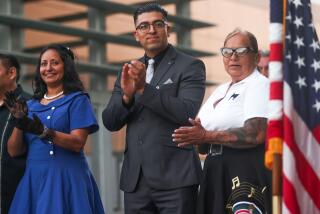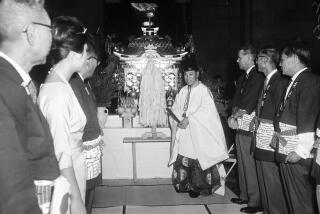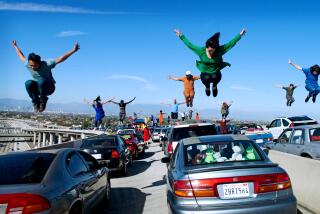Town Historian’s Olympic Effort Is Given a Boost
A grass-roots effort to commemorate the 20th anniversary of the Olympic cycling race through the streets of Mission Viejo is crawling toward the fundraising finish line after a reluctant City Council contributed in the home stretch.
The Olympic memorial project was conceived two years ago by Ziggy Wilfczynski, the town historian who had served as a race marshal when cyclists pedaled through the city during the 1984 Summer Games.
Wilfczynski wanted to mark the spot on Olympiad Road where the race began and ended with a roadside monument and a cement ribbon embedded in the asphalt pavement like a finish line. An initial estimate put the cost at $30,000.
After his campaign won the public’s fancy -- he collected about $19,000 from businesses and residents, and other fundraisers have collected about $6,000 -- the City Council withdrew its pledge of six months ago to pick up the $30,000 tab.
Councilman William S. Craycraft initially had urged the donation, recommending it come from rental income derived from new cellphone towers. But after the community rallied around the monument, Craycraft said, he didn’t feel comfortable spending city dollars to carry the load.
“City government is there to provide for essential services for our residents,” he said. “This monument doesn’t fall into public safety or recreational services. It’s a noble cause to celebrate the 20th anniversary, but I’m not sure it’s necessary to write a blank check.”
Wilfczynski, a former engineering superintendent with the Mission Viejo Co., said he was saddened that a city traditionally supportive of youth and adult recreation was so reluctant to endorse this project.
“I’ve been so proud to be a resident of this community for 32 years,” said Wilfczynski, a member of the city’s heritage and activities committees. “We’ve always done things first-class here. But this whole thing has been so disappointing.”
Wilfczynski and others suspected the council’s turnabout had to do with election-year posturing as fiscal conservatives and, frustrated, he slowed his efforts to raise money.
“It’s a lot of politics,” Wilf- czynski said of the council’s decision to renege on its promise. “What’s $30,000 for this city? They have so much money. And they worry about what it’s going to be like tomorrow. We can’t live like this. We have to live for this time.”
Councilman Lance MacLean agreed:
“We’re in a city with a $50-million budget and we’re arguing about $30,000?” MacLean said. “It’s been on the council agenda four times, and we’ve spent countless hours debating what should have been a no-brainer. The fact that the community has rallied around it sends a message that it’s important.”
Wilfczynski’s fundraising campaign got its second wind last week, when MacLean urged that the city kick in $11,000 toward the effort. The money, he suggested, could be culled from the City Council’s unused travel budget. With no comment, the council quietly voted to support the motion.
Until City Hall’s contribution, the two biggest donations raised by Wilfczynski came from Mission Hospital Regional Medical Center and Big Brothers & Big Sisters, which gave $5,000 each.
Encouraged by the city’s contribution, Wilfczynski is actively fundraising again, hoping to raise $40,000 because project costs have risen above the initial bids. The memorial as now envisioned will feature the start/finish line, two pilasters on either side of the road topped by bronze sculptures of bicyclists, and a plaque honoring the donors.
A July 31 ceremony commemorating the anniversary of the bicycle race will coincide with the Big Brothers & Big Sisters 5K run around Lake Mission Viejo. At that time, the monument will be dedicated at the entrance to the Youth Athletic Park on Olympiad Road.
“I was worried this was never going to happen,” Wilfczynski said. “But it’s something the community will have forever.”
And Wilfczynski said he would forever remember the men’s and women’s races that attracted more than 100,000 spectators to Mission Viejo 20 years ago and earned the United States two gold medals.
“To hear the American national anthem playing twice was incredible,” said Wilfczynski, a Polish immigrant. “Especially against racing powers like Spain, Norway and Germany. That’s why to me, it’s worth spending the time and money.”
More to Read
Go beyond the scoreboard
Get the latest on L.A.'s teams in the daily Sports Report newsletter.
You may occasionally receive promotional content from the Los Angeles Times.






